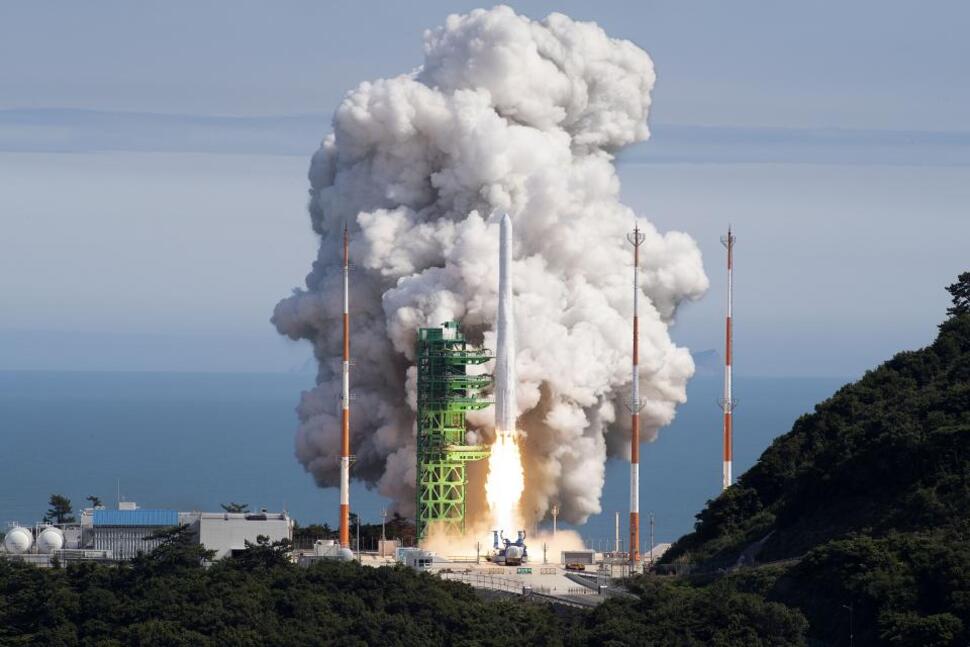[Aug] Korea aspires to become leading space industry country
Date Aug 23, 2022
 The Danuri lunar orbiter, launched atop SpaceX's Falcon 9, lifts off from Cape Canaveral Space Force Station in Florida, August 5 (KST). / Courtesy of Ministry of Science and ICT
The Danuri lunar orbiter, launched atop SpaceX's Falcon 9, lifts off from Cape Canaveral Space Force Station in Florida, August 5 (KST). / Courtesy of Ministry of Science and ICT
Many countries are vying to become a space industry leader by nurturing talent and securing technology. Korea is keenly taking part and will soon be able to conduct scientific research from data transmitted by an orbiter it has sent to study the moon.
On August 5, Korea’s first lunar orbiter, “the Danuri,” was launched into space atop a SpaceX Falcon 9 rocket. The domestically developed orbiter was then successfully placed into Earth-moon transfer orbit and has begun its four-and-a-half-month journey to reach lunar orbit in December. Once in lunar orbit, the Danuri will spend about a year carrying out scientific missions.
The successful launch of the Danuri is not Korea’s only space-industry achievement.
On June 22, the country sent the locally developed Korea Space Launch Vehicle II (KSLV-II), also known as Nuri, into space.
With that successful liftoff, Korea became the seventh country in the world to place a satellite weighing over a ton into orbit using domestically developed technology, following Russia, the United States, France, China, Japan and India.
This year marks the 30th anniversary of Korea’s first launch of a low-Earth-orbit satellite, the KITSAT-1.
The history of Korea’s space development began 30 years ago as the nation successfully placed a 48.6-kilogram satellite in orbit at an altitude of 1,300 kilometers above Earth.
 Nuri, Korea’s first locally developed launch vehicle, lifts off from the Naro Space Center in Goheung, Jeollanam-do Province, June 22. / Courtesy of Korea Aerospace Research Institute
Nuri, Korea’s first locally developed launch vehicle, lifts off from the Naro Space Center in Goheung, Jeollanam-do Province, June 22. / Courtesy of Korea Aerospace Research Institute
Although Korea began developing its space industry a step behind other advanced countries, the government believes that the Nuri and Danuri launches herald the country becoming a major player in the new space economy era.
The space economy refers to the economy beyond Earth, such as exploring deep space, extracting resources that are rare on our planet and developing technologies required for space exploration.
The space industry is seen as having enormous potential since the ever-improving technologies used to launch rockets, satellites and orbiters will advance the country’s ICT-, machinery- and chemistry-related capabilities as well as create high-quality jobs.
President Yoon Suk Yeol also vowed support for the development of the space industry, saying “The government will open the era of the space economy.”
During his visit to the Korea Aerospace Research Institute's Daejeon office on July 6, the president added, "It is no exaggeration to say that our future depends on space, which is a key area of national competitiveness.”
Going one step further, the government is scheduled to announce its fourth master plan for the promotion of space development in December.
That plan is expected to set the direction of the country’s space industry development and establish a cooperative system with private companies for the period from 2023 to 2027.
It also remains to be seen whether the country will create a Ministry of Space, a cabinet-level organization dedicated exclusively to space development.
Oh Tae-seog, the First Vice Minister of Science and ICT, said the fourth master plan “will cover mid- to long-term national space development goals, ranging from research and development to the space industry, security and diplomacy, and how to cooperate with the private sector.”
**If you have any questions about this article, feel free to contact us at kocis@korea.kr.**

The Ministry of Culture, Sports and Tourism's "Korea Here & Now" work can be used under the condition of "Public Nuri Type 1 (Source Indication)."




